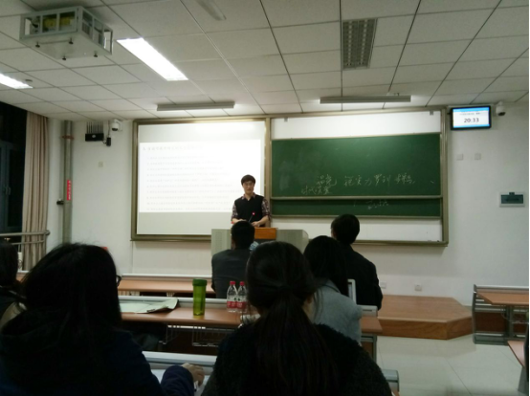On the evening of April 9, 2018, Professor Zeng Xianghong from the School of Management and Institute of Central Asian Studies of Lanzhou University gave an academic lecture entitled "Problem Consciousness and International Studies" at Zhensheng Yuan, Qingdao Campus, which was hosted by the School of Political Science and Public Administration and presided over by Professor Wang Xueyu, Director of the Center for European Studies of Shandong University, and attracted many students to attend the lecture.

After a brief introduction of the lecturer and the lecture process, the lecture began. The lecture was divided into five parts: the definition of problem consciousness and its three dimensions, examples of problem consciousness, the theory of mainstream international relations and the theory of international relations. Problem awareness, some closely related to China, a few specific issues that can be studied currently. During the lecture, had professor explained all these questions with excellent quotations.
He begins by defining problem consciousness as the major issues of great academic and practical value that have not yet been effectively addressed, which often has three dimensions: time, space and culture. Then, he has been exploring why the Western world has achieved the industrial revolution (rise) but China has failed to embark on industrialization. "Roads "(in decline) as a specific problem consciousness and its interpretation to illustrate the dimensional character and significance of problem-consciousness. Joseph Lee's History of Science and Technology in China, Douglas North and Robert Thomas's The Rise of the Western World, Max -Weber's The Protestant Ethic and the Spirit of Capitalism, Immanuel Wallerstein's The Modern World System, Penn Mullen's The Great Diversion - Europe, China, and the Development of the Modern World Economy, all answered the question in terms of artifacts, institutions, ideas, production deprivation, and world linkages. He then analyzed the problematic consciousness behind the mainstream international relations theory, and structural realism's answer to the question “Why the bipolar system is more stable than multi-polar systems?”, Neoliberal institutionalism answers the question "How to maintain international order after the decline of hegemony?" Structural constructivism explains "Why did the Cold War end in a peace way ". Immediately afterwards, he raised awareness of some of the issues related to China, such as how, before Western colonization, the East was able to sustain nearly five centuries of peace and stability? Why did the West take the balance of power for granted while China see unification as a matter of course? How could China effectively maintain stability amidst the dramatic economic and social changes brought about by reform and opening-up? Can China integrate into the international community and how? In response to the awareness of these issues, the results of previous research were listed separately. He concluded with a series of specific questions that could be explored.
Translator: Xiao Cheng
Editor: Huang Dong
Editor in Charge: Wang Xueyu